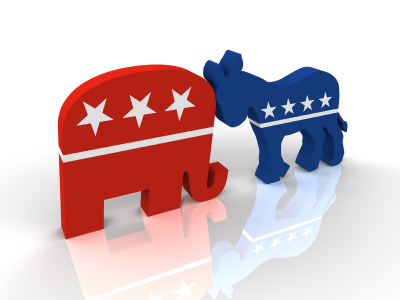Response to Arizona tragedy underscores moral bankruptcy of two-party politics

The highly-politicized reaction to the Tucson massacre by professional partisans in the Democratic and Republican parties reveals the abject moral bankruptcy that has come to define our politics under the reigning two-party state.
In the aftermath of Saturday’s shooting, Democratic party activists quickly took to the Internet casting blame for the act of a lone gunman on the rhetoric of Sarah Palin, the enthusiasm of Tea Party activists, and the long-standing policies of the GOP. As W.E. Messamore documented here yesterday, however, such wild accusations were both premature and misplaced. Yet, that did not stop Republicans from joining in on the game. Indeed, the immediate response on numerous Republican-friendly websites was to insinuate a connection between the assassin and the Democratic party.
A post at HillBuzz asked, “Is Daily Kos involved in Arizona murders?” writing:
“Daily Kos, DemocraticUnderground, and other George Soros-funded Leftist sites routinely use turns of phrase that seem to encourage bodily harm towards their political opponents. . . . It remains to be seen if the gunman involved in today’s shooting of the Congresswoman and a dozen others is directly connected to Daily Kos, but it would not be at all surprising if he was.”
By Saturday evening, popular conservative Republican bloggers such as Jim Hoft had begun identifying the assassin as “left-wing shooter Jared Loughner.” On Sunday, the founder of the Tea Party Nation, Judson Phillips, wrote to supporters that:
“The left is coming and will hit us hard on this. We need to push back harder with the simple truth. The shooter was a liberal lunatic. Emphasis on both words," according to a report at The Atlantic.
Rush Limbaugh has since gone so far as to assert that “Loughner knows he has the full support of a major political party in this country . . . he knows that the Democrat Party is attempting to find anybody but him to blame.” As it was reported that Loughner was not in fact a Republican or Democrat, but was rather a registered Independent, Limbaugh went on to allege a connection between the assassin and the newly formed No Labels organization. He continued:
"all these moderates, great independents, who did they vote for in November? Republicans, I think. And Mr. Loughner, if anything, he was a No Labels guy. He himself was No Labels! He wasn't a Republican or Democrat. He didn't like politics. He's made to order for the No Labels group, and he's a murderer!"
The tit-for-tat accusations and assertions that have characterized the response to this tragedy are definitive of Democratic-Republican party politics. In an op-ed for the Sunday New York Times, Paul Krugman denounced the “climate of hate,” and the cascade of “toxic rhetoric . . . coming overwhelmingly from the right.” The next day, on the other side of the duopoly divide, Michelle Malkin denounced the “progressive climate of hate” with an “illustrated primer,” announcing, “They want to play tu quo que in the middle of a national tragedy? They asked for it. They got it.”
When did “I know you are but what am I?” become the primary mode of political discourse in our country?
The debate, if we may dignify such exchanges with that term, reached a boiling point so quickly, CBS News conducted a poll on Sunday and Monday asking Americans whether the “harsh political tone” and heated atmosphere of US politics had anything to do with the Arizona shooting. Overall, a majority of Americans answered in the negative, 57% to 32%. But the partisan divide between Republicans and Democrats was apparent in the findings. Republicans overwhelmingly rejected any connection between the tone of our national politics and the shooting, 69% to 19%, while Democrats were more conflicted, with 49% denying the connection and 42% affirming the existence of one. The responses of Independents, on the other hand, more closely mirrored the overall findings, with 56% answering in the negative and 33% affirming a connection.
Whether there is any such connection or not, the reactive, politicized response to this tragedy appears to signal a qualitative change in the politics of the two-party system, and it is not for the better. As Nick Gillespie angrily argued in an article for Reason:
“The problem isn't with the current moment's rhetoric, it's with the goddamn politicization of every goddamn thing not even for a higher purpose or broader fight but for the cheapest moment-by-moment partisan advantage.”
He concludes with a rhetorical question reflecting on the rise in the numbers of Independent voters:
“Faced with the way that the major parties and their partisans try to bend every news story, trend, box office hit or bomb, you name it, whether truly horrific (as Saturday's shooting was) or totally banal, is it any wonder that fewer people want to be affiliated with the Dems and Reps?”




